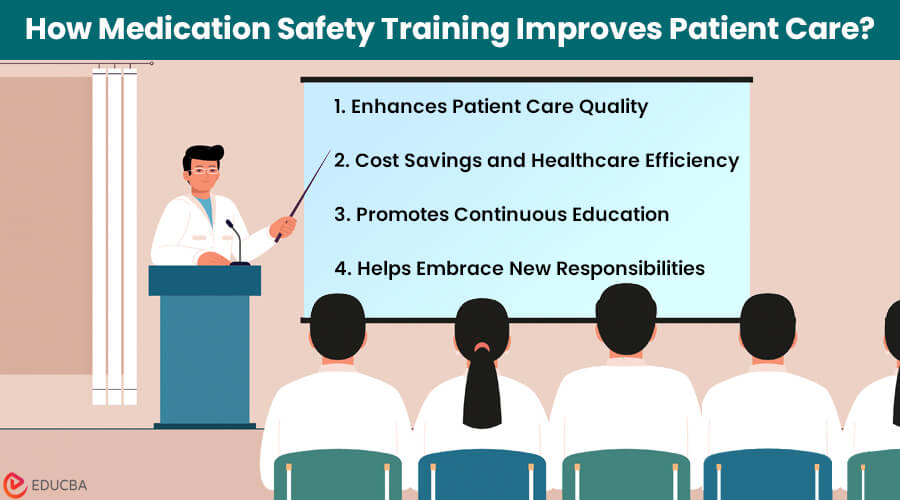
Importance of Medication Safety Training in Today’s Healthcare Landscape
The rapid growth of the healthcare industry and the rise in chronic diseases have made the issue of medication safety of utmost importance. Medication safety is essential in ensuring patients’ wellness and recovery, and healthcare professionals (care staff) are undoubtedly the most important figures in this area. Comprehensive medication training for care staff is essential, providing them with intimate knowledge of medication management complexities. This foundational training is crucial for reducing medication errors and improving patient care quality. This article will examine what medication safety training is, why it is important, and how it improves patient care.
Table of Contents (TOC)
- Importance
- What is it?
- Why is it necessary for care staff?
- How does it improve patient care?
- Challenges
What is Medication Safety Training?
Medication safety training educates healthcare professionals about safe medication use, minimizing errors & ensuring effective treatment.
It covers various topics such as:
- Writing prescriptions correctly
- Pharmacology
- Dispensing medications safely
- Drug-drug interactions
- Storing medications properly
- Monitoring their side effects
- Educating patients
- Following guidelines
- Using technology for safety
- Encouraging reporting and learning from errors.
- Correct principles of safe medication administration
- Legal and ethical considerations in medication management
This training helps them provide the best treatment for patients while preventing any negative effects that may arise.
Why is Medication Safety Training for Care Staff Necessary?
Without proper training, medication errors can occur, leading to serious harm to patients. Therefore, the importance of medication safety training for care staff cannot be overstated.
Here are some reasons why medication safety training is essential for care staff:
- When care staff deliver medications to patients properly, it reduces the chances of harm. The proper way includes many aspects of medication safety, such as administering the medication, calculating the dosage, storing the medication, labeling, and reporting any errors.
- Training helps the care staff to recognize any adverse reactions to particular medicines.
- Following proper training ensures that staff comply with legal standards, thereby minimizing the risk of legal consequences.
- This training enables staff to offer individualized care, adhere to medication schedules, monitor patient conditions, and handle emergencies while communicating effectively with patients and families.
- Proper documentation of medication administration is essential for maintaining accurate patient records.
- Ongoing training ensures that staff members remain confident and up-to-date with new medications and best practices.
How Medication Safety Training Improves Patient Care?
Medication safety training significantly enhances patient care by:
1. Enhancing Patient Care Quality
Imagine a care staff member administering medication to a patient with multiple chronic conditions. Without proper medication safety training, a care staff member may not understand the potential drug interactions or side effects, risking improper administration and adverse reactions.
However, if the care staff member receives adequate training, the staff member can better manage the patient’s medication regimen, ensuring correct medication and dosage at the appropriate times.
This results in better patient outcomes, fewer hospital readmissions, and higher patient satisfaction. Hence, training is essential for care staff to deliver top-notch patient care.
2. Cost Savings and Healthcare Efficiency
By preventing errors and adverse drug events, medication safety training contributes to overall cost savings in healthcare, resulting in reduced expenses related to hospitalizations, treatments, and legal liabilities.
3. Promoting Continuous Education
Let’s take the example of a care staff member responsible for administering medication to a diabetic patient. When the care staff member received their initial medication safety training, they were taught about the proper administration of insulin and the potential side effects of the medication.
However, new developments emerged over time, such as new insulin formulations and changes in dosing guidelines. Thus, the care staff member may need further training on new insulin formulations and dosing guidelines.
Thus, medication safety is a continuous journey, not a one-time accomplishment. It requires ongoing education to address new developments, such as new drug approvals, recalls, and emerging evidence on drug effectiveness and safety.
4. Embracing New Responsibilities
Continuous education is important not only for ensuring that care staff remain proficient in their roles but also for addressing their ever-changing job responsibilities and adapting to the rapid healthcare innovation rate.
Challenges
Implementing medication safety education faces several challenges, such as:
1. Resource Constraints
Limited funding and staffing may delay the development and delivery of comprehensive training programs.
2. Time Constraints
Healthcare professionals face challenges finding time for training due to their demanding clinical schedules.
3. Resistance to Change
Some healthcare professionals may hesitate to adopt new medication safety practices due to doubt about their effectiveness or unwillingness to change.
4. Access to Training
Geographical barriers or limited access to educational resources may prevent healthcare professionals, especially those in rural or underserved areas, from receiving adequate training.
5. Technological Barriers
Limited access to technology or inadequate training in its use may delay the implementation of digital tools for medication safety training.
6. Cultural Barriers
Differences in organizational culture or attitudes toward medication safety may hamper the successful adoption of training initiatives.
7. Sustainability
Sustainability in medication safety training depends on ongoing support such as efficient resources, time, funding, and proper training from healthcare leaders for long-term success.
8. Keeping Pace with Advances
When new technology is introduced in medication management, it’s important to update training materials. This ensures healthcare professionals are skilled in utilizing the latest advancements. However, keeping up with technological advancements is challenging as it continuously evolves.
Final Thoughts
Medication safety training is essential for top-notch patient care, error prevention, and better healthcare results. Healthcare providers must prioritize this training to ensure a safe and patient-focused environment. In the future, medication safety will become even more critical, highlighting the importance of well-trained staff.
Recommended Articles
We hope this article on “Medication Safety Training” was helpful to you. You can also refer to the articles below to learn more.
